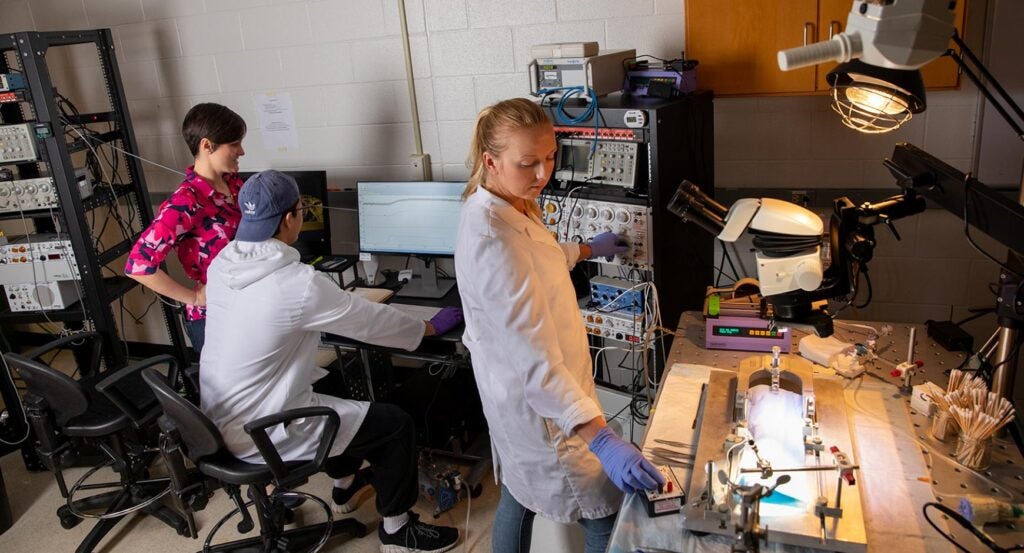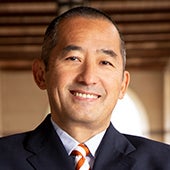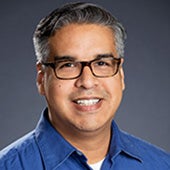Exercise Physiology
Department of Kinesiology and Health Education

Exercise Physiology is the study of how our bodily systems respond and adapt to stimuli of acute and chronic exercises and how these changes are related to health, disease, physical function, and performance. Our Exercise Physiology program offers students the opportunity to explore practical areas of study that prepare them for a career promoting healthy lifestyles.
Additionally, graduate students can focus on a research-intensive route that benefits from the vast amount of resources and knowledge provided by the university and faculty.
Students are assigned to an advisor who will guide them through their degree to ensure that they are completing the most optimal coursework in preparation for their future career.
Exercise Physiology provides several options for graduate degrees. We offer a practical M.Ed. graduate program that aims to prepare students to work in clinical rehabilitation, sport science and nutrition fields.
Our research-driven degrees include M.S. and Ph.D. programs that pair students with a faculty mentor. These programs carry out research in various topics studying acute and chronic exercise responses and adaptations related to metabolic and cardiovascular health in people who are physically inactive, aged or diseased.
Students pursuing research-driven degrees are strongly encouraged to contact the professor conducting research that matches their research interests.
Degrees
Faculty



Researches the anti-inflammatory and antioxidant effects of the Acai berry to improve performance and increase adherence to exercise and physical activity.

Biochemical techniques including ELISA's, multiplexing, automated western blotting, associated data analyses, and standard wet lab skills. Research involving diabetes, inflammation, and neural control of circulation.

Investigates the potential mechanisms for elevated sympathetic activation in patient populations such as type 1 and 2 diabetes and racial disparities in vascular function and blood pressure responses during exercise in health and disease.

Exploring neuro/biological mechanisms driving physical activity motivation to develop interventions that enhance long-term exercise participation and human well-being.
Accepting new students

Takes an integrative physiology approach to environmental and behavioral determinants of bone health with a focus on bone-immune interactions.
Accepting new students

Experienced certified strength and conditioning specialist who develops curriculum for fitness professionals and conducts physiological assessment and exercise program design for those with chronic diseases.

Teaches and develops undergraduate medical fitness and rehabilitation curricula and works with the health fitness instructor specialization.

Autonomic control of circulation during exercise in health and disease, specifically in type 1 and type 2 diabetes

Effects of vascular dysfunction due to aging, and the lifestyle habits that can prevent or reverse dysfunction. Role of peripheral vascular dysfunction in the pathogenesis of cognitive and cerebrovascular dysfunction Reduction in physiological functi...
Accepting new students
Labs and Research Areas
Autonomic Control of Circulation Laboratory
Investigates the effects of type 1 and type 2 diabetes on the neural control of circulation during exercise.
Cardiovascular Aging Research Laboratory
Investigates the influence of aging and lifestyle modifications on vascular function and disease risks.
Provides clinical research services for health/fitness research and conducts the popular “Get FIT” program. Outcome measures include body composition, bone density, and cardio-respiratory and musculoskeletal health assessments.
Health and Integrative Physiology Laboratory
Investigates the mechanisms underlying the link between lifestyle behaviors, metabolic health, and chronic diseases including cardiovascular disease and type 2 diabetes in at-risk populations.
Investigating the types of physical activity and exercise that keep people healthy and allow them to achieve their physical potential.
The Physical Activity Motivation Lab
Researches biological drivers of physical activity motivation to help people enjoy and sustain physically active lifestyles for lasting health benefits.
Translational Osteoimmunology Lab
Uses a systems biology approach to investigate environmental and behavioral determinants of lifelong bone health.



